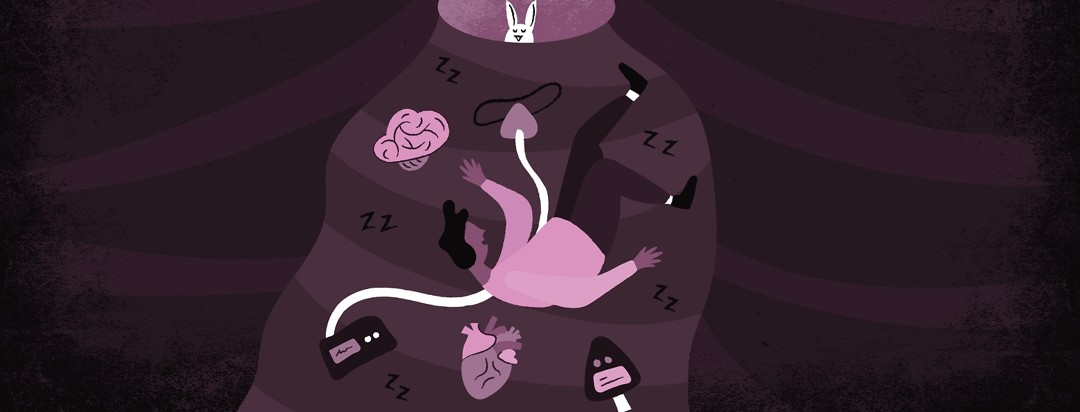Down the Sleep Apnea Rabbit Hole: Mental Health
There's a kind of rabbit hole we can fall in when we begin to learn about an ongoing (chronic) health condition. Obstructive sleep apnea (OSA) is 1 such condition. It's chronic because it happens every time you sleep and can only be managed through therapy. Very rarely does it simply go away or cure itself.1
What seems like a mechanical problem of breathing during sleep turns out to be far more complex in its reach within our overall health. Untreated OSA is associated with a wide variety of other chronic health conditions, including high blood pressure, type 2 diabetes, and even mental health issues.1
Obstructive sleep apnea and mental health
Studies show a clear link between OSA and the increased risk for mood disorders like depression. OSA factors into a number of mental health concerns besides major depressive disorder (MDD), such as generalized anxiety disorder (GAD), schizophrenia, bipolar disorder, post-traumatic stress disorder, substance misuse, and panic attacks.2,3
Depression and sleep apnea
The symptoms experienced by people with MDD or OSA are often the same. These include:3
- Daytime fatigue
- Daytime sleepiness
- Poor concentration
- Irritability
- Weight gain
Someone who experiences a mood disturbance like depression may, after going through an OSA screening, discover they also have a hidden case of sleep apnea. Studies have found that people with MDD may face a greater risk for having OSA. This can be the case for people with chronic insomnia, also well known for its overlap with MDD.4,5
It appears that low serotonin levels link depression and sleep apnea, in differing ways. The brain uses serotonin to regulate mood, so low levels imply poor mood. Serotonin also serves a role in the nerve function of the upper airway. Insufficient serotonin could be part of the complex set of conditions leading to OSA.4
Anxiety and sleep apnea
Similarly, those with OSA are almost 2 times as likely to develop GAD. One study also showed that the more severe the case of OSA, the higher the chance for symptoms of anxiety. In fact, the majority of people (two-thirds) who suffered from anxiety in that study also dealt with severe cases of OSA.6
This or That
What do you need more right now?
When sleep apnea causes mental health problems
If OSA and depression or anxiety are diagnosed in a single individual, what's the best way to move forward? Generally, the best protocol is to treat OSA as the primary condition, as it may be the root cause of your depression or anxiety. Once it's treated, there's a good chance that the depressive or anxious symptoms will lighten up or even go away.7
Also, use of certain antidepressant and anti-anxiety medications (such as benzodiazepines and other sedatives or hypnotics) could actually worsen some symptoms of OSA. This may explain why your doctor may wish to at least start with a form of positive airway pressure (PAP) therapy (such as continuous positive airway pressure or "CPAP") before treating the mental health symptoms. Research confirms that CPAP use can greatly improve the severity of depression and anxiety, especially in women.7,8
Don't go it alone
It can be difficult to know when having 1 mental or physical health problem may bring on a secondary problem. Chronic illness is like that, unfortunately. One set of health problems can lead to a domino effect over time.
If you’re unsure about the root cause of your sleep problems, don't guess why or ignore the situation. Mention your concerns to your doctor or a sleep specialist. With their help, you can determine whether you have new mental or physical health concerns requiring treatment.
The answer may be no, but if it's yes, your healthcare provider can pinpoint any potential links to OSA. Ultimately, identifying and treating the problem – and getting more and better sleep – should be your goal.
Tell us your sleep apnea story and share a comment below.
Community Poll
Do you feel that people living with you have been affected by your sleep apnea symptoms?

Join the conversation